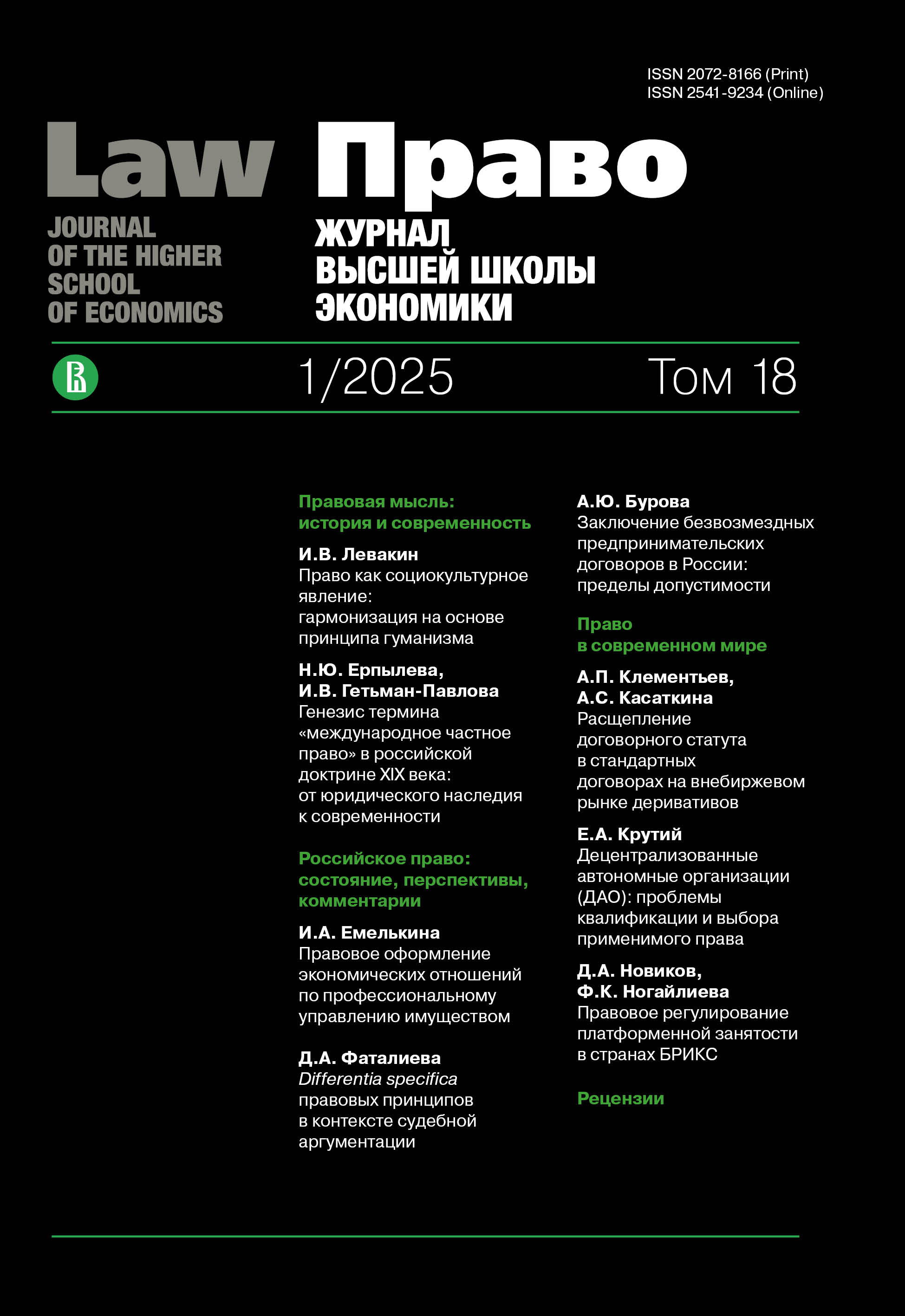Заключение безвозмездных предпринимательских договоров в России: пределы допустимости
Аннотация
Статья посвящена анализу ограничений при заключении безвозмездных предпринимательских договоров. Целью исследования выступает определение отношения российского законодателя к заключению безвозмездных договоров в отношениях между коммерческими организациями и оценка необходимости запрещения указанных договоров. Для достижения указанной цели рассмотрена категория «встречное предоставление» и обращено внимание на принцип возмездности гражданско-правовых договорных отношений безотносительно к их субъектному составу. На основе норм Гражданского кодекса устанавливаются четыре запрета (ограничения), касающихся безвозмездных договоров между предпринимателями. Проводится критическая оценка закрепленного в Кодексе запрета на дарение в отношениях между коммерческими организациями. Сделан вывод, что единственным разумным основанием такого запрета является защита интересов миноритарных участников юридического лица-дарителя, либо участников, которые не знали и не могли знать о совершении данных сделок. Устанавливается наличие злоупотреблений, проявляющихся в противоречивом поведении стороны, заключившей безвозмездный договор, но впоследствии требующей признания его недействительным, а также злоупотреблений, связанных с отказом судов в признании частичного прощения долга дарением. Среди негативных аспектов запрета на дарение между предпринимателями отмечается возложение бремени доказывания наличия встречного предоставления на сторону, являющуюся ответчиком по иску, в силу затруднительности доказывания истцом отрицательного факта о неполучении встречного предоставления. При анализе судебной практики и доктрины выявлена тенденция к распространению сферы действия нормы, запрещающей договор дарения между коммерческими организациями, на иные договоры, которая должна пресекаться в силу разной направленности данных видов договоров и невозможности применения рассматриваемого правила по аналогии. Выдвинуто предложение об исключении из гражданского законодательства норм, запрещающих заключение безвозмездных договоров в отношениях между коммерческими организациями, в силу наличия иного способа обеспечения заинтересованными лицами своих интересов — путем оспаривания заключенного безвозмездного договора по основанию, предусмотренному п. 2 ст. 174 Кодекса.
Литература
Abesalashvili M.Z., Tutarisheva S.M., Pshizova E.N. (2023) The concept, types and system-forming features of gratuitous contracts in modern civil legislation. Voprosy rossiyskogo i mezhdunarodnogo prava=Issues of Russian and International Law, vol. 13, no. 9, pp. 384-391.
Abramov V.Yu., Abramov Yu.V. (2023) Legal regulating new types of entrepreneurial activity: a guide. Moscow: Yustitsinform, 320 p. (in Russ.)
Astakhova M.A. (2006) Remunerative and gratuitous in civil law. Sovremennoe pravo=Modern Law, no. 12, pp. 76-79 (in Russ.)
Belykh V.S. (ed.) (2020) Contractual regulation of entrepreneurial activity: textbook. Moscow: Prospekt, 718 p. (in Russ.)
Braginsky M.I., Vitryansky V.V. (2011) Contract law. General provisions. Moscow: Statut, 847 p. (in Russ.)
Braginsky M.I., Vitryansky V.V. (2011) Contract law. Contracts for transfer of property. Moscow: Statut, 780 p. (in Russ.)
Ershova I.V., Otnjukova G.D. (eds.) (2011) Russian entrepreneurial law: textbook. Moscow: Prospekt, 1072 p. (in Russ.)
Evangelevskaya L.V. (2012) Invalidity of the gift agreement in the field of entrepreneurial activity. Candidate of Juridical Sciences Summary. Rostov-on-Don, 31 p. (in Russ.)
Gorbach O.V. (2024) Entrepreneurial contract: essence, content, features. Sibirskiy yuridicheskiy vestnik=Siberian Law Herald, no. 2, pp. 44-50.
Gubin E.P., Lakhno P.G. (eds.) (2023) Entrepreneurial law of the Russian Federation: textbook. Moscow: Norma, 808 p. (in Russ.)
Kamyshansky D.G. (2015) On the gratuitousness of civil contracts. Vlast' zakona=The Rule of Law, no. 1, pp. 166-171 (in Russ.)
Konobeevskaya I.M. (2018) Prohibition of gifts to certain categories of persons under civil law. Vestnik Voronezhskogo Universiteta. Pravo=Proceedings of Voronezh University. Law, no. 4, pp. 149-159 (in Russ.)
Kuzina M.I. (2018) On the possibility of concluding a contract of loan by commercial organizations. Rossiyskiy yuridicheskiy zhurnal=Russian Legal Journal, no. 2, pp. 105-109 (in Russ.)
Levushkin A.N. (2020) Contracts in entrepreneurial activity: textbook. Moscow: Prospekt, 400 p. (in Russ.)
Romanets Y.V. (2019) System of contracts in the civil law of Russia. Moscow: Norma, 496 p. (in Russ.)
Rubtsova N.V. (2016) Origins of the entrepreneurial contract. Problemy ekonomiki i yuridicheskoy praktiki=Issues of Economics and Legal Practice, no. 3, pp. 183-186 (in Russ.)
Sayapin S.P. (2024) Civil law regulation of investment relations using digital platforms: Candidate of Juridical Sciences Thesis. Moscow, 229 p. (in Russ.)
Sergeev A.P. (ed.) (2020) Civil law: textbook. Vol. 1. Moscow: Prospekt, 1040 p. (in Russ.)
Shapsugova M.D. (2020) Entrepreneurial contracts as a form of entrepreneurial activity. Severo-Kavkazskiy yuridicheskiy vestnik=North Caucasian Legal Bulletin, no. 1, pp. 121-126. DOI: https://doi.org/10.22394/2074-7306-2020-1-1-121-126
Suslikov V.N., Dyukarev D.A. (2014) The concept of a remunerative contract in the Russian Federation and abroad. Probely v rossiyskom zakonodatelstve. Yuridicheskiy zhurnal=Gaps in Russian Legislation. Legal Journal, no. 6, pp. 50-52 (in Russ.)
Copyright (c) 2025 Бурова А.Ю.

Это произведение доступно по лицензии Creative Commons «Attribution-ShareAlike» («Атрибуция — На тех же условиях») 4.0 Всемирная.


















